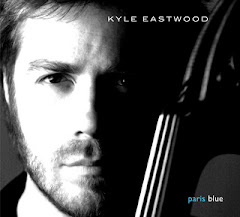Let me start by saying that, I assumed it would be a jazz
work (especially with one of my favorite jazz pianists, Fred Hersch, assisting
in the producer’s chair on this recording), but Mr. Kallor’s music (the
recording is all original compositions in a suite format) tends more toward the
classical side. The song titles are evocative of themes that you might expect
could be either classical or jazz, like “Broken Sentences” and “Espresso
Nirvana”, but Kallor takes the proposed themes a lot farther and deeper than
the typical listener probably expects. They end up being far more dramatic and
classical sounding, with movements and themes being presented within the songs
themselves, but also propping up the “Homage to New York” theme of the entire
work. I found some of the songs, “Straphanger’s Lurch” and “Giants” for
example, are like mini-concerts themselves, with multiple movements,
intertwining themes, tension building and resolution, all in neat, small
packages.
As for the piano side, I honestly felt Mr. Kallor is about
as technically brilliant as any modern pianist I've heard lately. While he’s
nowhere near as bluesy as Keith Jarrett or Chick Corea, he does exhibit some of
the fluid “moodiness” of Jarrett’s earlier solo work. Not surprisingly, the
overall sound and temperament of the Kallor’s playing was very similar to
Mehldau’s trio work (although I don’t think it compares well to his more recent
work, even if it is less jazzy). Still, Kallor does easily demonstrate the same
control of dynamics and timing that Mehldau is becoming more and more known
for. Many of the songs as played by Kallor also have variations in tonality
that require a certain sensibility and attention to overall effect that
contemporary pianists do not always actively foster these days, but Kallor
transitions easily from speedy-soft, to slow-soft, to slow-loud, to speedy
loud, or whatever is required. I found his phrasing during these transitions to
be slightly on the exotic side, not unlike Gonzalo Rubalcaba’s Cuban influenced
solo work. The sound of the work is crisp and clear, never muddied or vague, no
doubt one of the big advantages of having a fellow pianist as producer.
A Single Noon is an interesting piece of music. Since I skew
to jazz pretty much all the time, I must confess this classic-leaning recording wasn't exactly to my taste, but Mrs. S drags me to just enough classical concerts
(usually with a “But there’s a piano” interjected in the argument) that I could
appreciate and enjoy what I was listening to. The songs are original and
interesting, and Kallor’s playing is stunning at times and always proficient,
so when it comes time to post my review on Amazon, I’ll have no problem giving
it four stars. Excellent stuff. I was definitely privileged to receive an
advance copy, so thank you Andrew and Gregg wherever you are!










